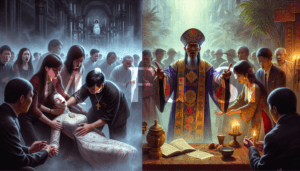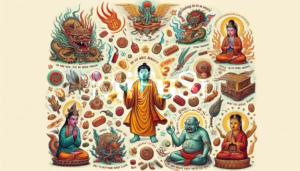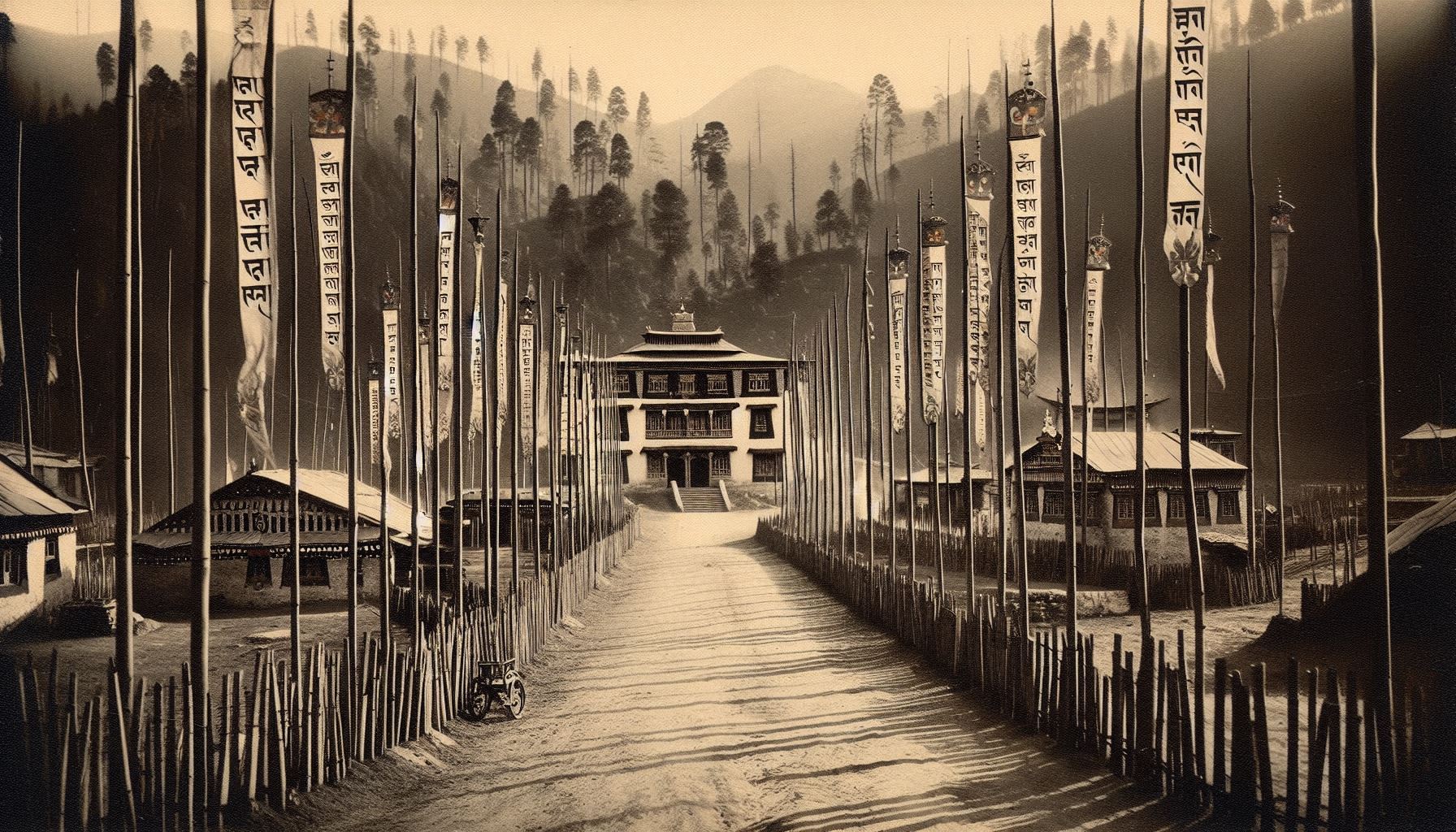An Ascetic and the Dalai Lama
(Excerpt from Alexandra David-Neel’s Magic and Mystery in Tibet, Dover Publications, Inc., 1971)
Thubten Gyatso (1876 –1933) was the 13th Dalai Lama of Tibet. At Kalimpong, India, the lama-king lived in a large house belonging to the minister of the Rajah of Bhutan. To give the place a more majestic appearance, two rows of tall bamboo poles had been planted in the form of an avenue. Flags flew from every pole, with the inscription Aum mani padme hum!, or the “horse of the air,” surrounded by magic formulas.
The suite of the exiled sovereign was numerous and included more than a hundred servants. They were for the most part engaged in interminable gossip, and quite reigned round the habitation. The splendor, decorum and etiquette of the Potala were absent in that land of exile. Those who saw this road-side camp, where the Head of the Tibetan theocracy waited for his subjects to reconquer his throne, could not imagine what the Court at Lhasa was like.
One evening in 1912 at Kalimpong, Alexandra David-Neel had witnessed the benediction of the pilgrims by the 13th Dalai Lama. Among Lamaists, the manner of the blessing varies with the social rank of the blessed. The Lama places both hands on the heads of those he most respects. In other cases, only one hand, two fingers or even only one finger. Lastly comes the blessing given by slightly touching the head with colored ribbons, attached to a short stick.
In every case, however, there is contact, direct or indirect, between the lama and the devotee. This contact, according to Lamaists, is indispensible because the benediction, whether of people or of things, is not meant to call down upon them the benediction of God, but of infuse into them some beneficial power that emanates from the lama.
The large number of people who came to Kalimpong to be touched by the Dalai Lama gave her some idea of his widespread prestige.
As she was watching this scene, her eyes fell on a man seated on the ground. His matted hair was wound around his head like a turban, in the style common to Hindu ascetics. Yet, his features were not those of an Indian and he was wearing dirty and much-torn lamaist monastic garments.
This tramp had placed a small bag beside him and seemed to observe the crowd with a cynical expression.
Alexandra asked her interpreter who this person was. The interpreter started a conversation with him and said “This lama is a peripatetic ascetic from Bhutan. He lives here and there in caves, empty houses or under the trees. He has been stopping for several days in a small monastery near here.”
Alexandra had no plan for that afternoon and she suspects that vagabond was mocking at the Dalai Lama and the faithful. She was curious about the reason and decided to visit this Naljorpa (an ascetic possessing magic powers) with her interpreter.
At the beginning, it was difficult to start a conversation with the ascetic, as his mouth appeared to be full of rice. He had only answered their polite greetings by a kind of grunt. They were trying to find a phrase to break the ice, when the strange fellow began to laugh and muttered a few words. The translator seemed embarrassed.
“What does he say?” Alexandra asked.
“Excuse me,” answered the interpreter, “these naljorpas sometimes speak roughly. I do not know if I should translate.”
“Please do,” she replied. “I am here to take notes; especially of anything at all curious and original.”
“Well, then-excuse me-he said, ‘What is this idiot here for?’”
“Tell him I have come to ask why he mocked at the crowd seeking the benediction of the Dalai Lama.”
“Puffed up with a sense of their own importance and the importance of what they are doing. Insects fluttering in the dung,” muttered the naljorpa between his teeth.
“And you,” she replied, “are you free from all defilement?”
He laughed noisily.
“He who tries to get out only sinks in deeper. I roll in it like a pig. I digest it and turn it into golden dust, into a brook of pure water. To fashion stars out of dog dung, that is the Great Work!”
“Are these pilgrims not right, to profit by the presence of the Dalai Lama and obtain his blessing? They are simple folk incapable of aspiring to the knowledge of the higher doctrines——-“
But the naljorpa interrupted her.
“For a blessing to be efficacious, he who gives it must possess the power that he professed to communicate.”
“Would the Precious Protector (the Dalai Lama) need soldiers to fight the Chinese or other enemies if he possessed such a power? Could he not drive anyone he liked out of the country and surround Tibet with an invisible barrier that none could pass?”
“The Guru who is born in a lotus (Padmasambhava, who preached in Tibet in the eighth century) has such a power and his blessing still reaches those who worship him, even though he lives in the distant land of the Rakshasas.”
“I am only a humble disciple, and yet—–“
It appeared to Alexandra that the “humble disciple” was maybe a little mad and certainly very conceited, for his “and yet” had been accompanied by a glance that suggested many things.
The interpreter meanwhile was visibly uneasy. He profoundly respected the Dalai Lama and disliked to hear him criticized.
Alexandra proposed to leave and handed a few rupees for the traveler to help him on his way.
The present displeased the naljorpa. He refused it, saying he had already received more provisions than he could carry.
The translator thought it right to insist. He took a few steps forward, intending to place the money on a table near the lama. Then Alexandra saw him stagger, fall backward and strike his back against the wall as if the had been violently pushed. He uttered a cry and clutched at his stomach. The naljorpa got up and, sneering, left the room.
“I feel as if I had received a terrible blow,” said the interpreter. “The lama is irritated. How shall we appease him?”
“Let us go,” she answered. “The lama has probably nothing to do with it. You, perhaps have heart trouble and had better consult the doctor.”
Pale and troubled, the interpreter answered nothing. Indeed there was nothing to be said. They returned, but she was not able to reassure him.
When exploring religious studies, it’s insightful to consider the works of Alexandra David-Néel, a French writer who immersed herself in Tibetan life. Residing in a cave, she delved deeply into Tibetan tantric Buddhism and identified strongly with the Tibetan culture, authoring around 100 books on her experiences. A central theme in her writings is the paradox of a figure who claims the authority to bless thousands yet cannot safeguard his own nation, ultimately becoming a refugee in a foreign land.
(updated 3/14/24)
Related Post

Introduction
Introduction Mat Giao (Secret Teachings) is pleased to present to our fellow practitioners the book "Mysticism in "The Investiture of...

MY AUNT’S SPIRIT POSSESSION
MY AUNT'S SPIRIT POSSESSION (Quỷ nhập- Câu chuyện ôn tập lời dạy của Tổ, Thầy by Bạch Hạc on Wed...

SELF-RELIANCE VS. DIVINE HELP
SELF-RELIANCE VS. DIVINE HELP by TTC on 04 May 2009, 03:18, translated by Horangi Question: What are the necessary steps...

Invisible Deities of Career
Invisible Deities of Career (Tổ vô hình các ngành nghề submitted by Khánh-am on 24 Mar 2009 - translated by...

HOW TO PRAY FOR THE NATION
HOW TO PRAY FOR THE NATION (Đại Nguyên Tắc: Tế Trời by NhưTrúc on Wed Apr 09, 2014 2:17 pm...

Haunted to Healed
Haunted to Healed Ấn chứng điểm đạo của TuTam by Tutam on 03 Oct 2016, 15:10, translated by Horangi My...

Meeting in the clouds
Meeting in the clouds Ngày đoàn viên By duynguyen on Nov 30, 2017 at 1:10 am, translated by chunglinho, edited...

Interpreting “Bùa” and “Chú” in Mystical Practices
Interpreting "Bùa" and "Chú" in Mystical Practices Translation from: Bùa, chú Mật tông by Akira When encountering spells, amulets, and...
